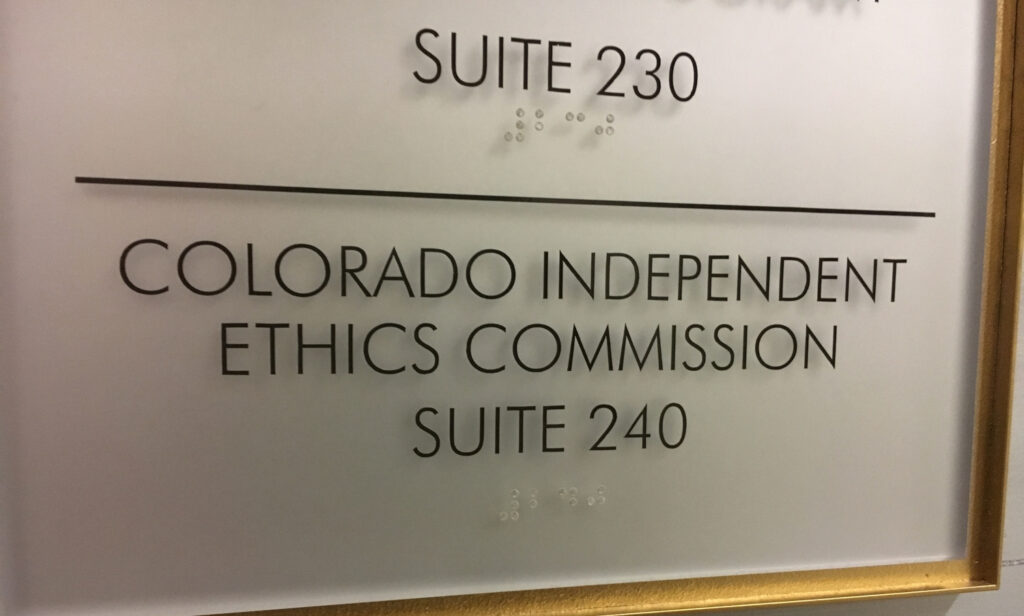By Jeffrey A. Roberts
CFOIC Executive Director
Neither the Colorado Open Records Act nor the Colorado Open Meetings Law applies to the constitutionally created state commission that investigates allegations of ethical misconduct involving public officials, the Colorado Court of Appeals has ruled.
Rejecting the Glendale mayor’s argument that a district court has jurisdiction to review the Colorado Independent Ethics Commission’s denial of his records requests, a three-judge appellate panel determined last week that the IEC is not a state agency or a state public body subject to Colorado’s open-government laws.

Glendale Mayor Michael Dunafon sued the ethics commission in 2018 after it refused to disclose records of executive sessions in which complaints against him were discussed. He contended the materials were no longer confidential once the IEC deemed the complaints “nonfrivolous,” but a Denver District Court judge dismissed his lawsuit for lacking subject matter jurisdiction.
In affirming the district court decision, the Court of Appeals cited a 2016 Colorado Supreme Court ruling which stated that the IEC “is not an executive agency; it is instead an independent, constitutionally created commission that is ‘separate and distinct from both the executive and legislative branches.’” The judges also referred to a statute that “established” the IEC — added to the Colorado Constitution by voter initiative in 2006 — in the judicial branch.
To be subject to CORA, an entity must be an agency, institution or political subdivision of the state, the appellate court wrote, and the IEC is neither an agency nor an institution. The open meetings law applies to state public bodies within state agencies, the court added, but “because the judicial branch is not a ‘state agency’ … and a state agency ‘as a whole cannot constitute a state public body’ under the open meetings law, the IEC falls outside the scope of the law.”
The ethics commission adopted its own records access policy in 2018 — incorporating CORA with some exceptions and additions — despite a letter objecting to the new rules sent by the Colorado Freedom of Information Coalition, the Colorado Press Association and the Colorado Broadcasters Association.
“There is absolutely no reason that the IEC should not be subject to the FULL Colorado Open Records Act,” the three organizations wrote. “Absent a court decision expressly finding that the IEC is not an entity covered by CORA, we believe the IEC is subject to CORA.”
Now that such a ruling exists, it’s unclear how someone could challenge a denial of IEC records or access to a closed IEC meeting. The Court of Appeals ruling only addressed whether Dunafon could seek judicial review of his records request as part of a case challenging the enforcement of any IEC penalties against him.
“Let’s say you’re a public interest group that wants to access records and gets denied,” said Josh Weiss, an attorney for Dunafon. “Based on what is now this precedent for the time being, it’s not clear if you’re even able to do that.”
“If the IEC decided tomorrow to stop holding public meetings,” Weiss told CFOIC, “it’s not clear who could challenge that or whether the IEC would actually be violating any rules given that they appear to operate in a special space where they make their own rules but aren’t really subject to much review.”
Although CORA and the open meetings law don’t apply to the IEC, “that doesn’t mean we are in no man’s land,” Assistant Attorney General Gina Cannan said during oral arguments before the Court of Appeals. “The (state) constitution constrains and governs the IEC and informs this court … and the constitution expressly provides that certain matters are to be public and certain matters are to be kept confidential.”
Weiss said he and Dunafon are still evaluating whether to ask the Colorado Supreme Court to review the appellate court ruling. “We’re obviously disappointed in the ruling and don’t think it’s the right outcome.”
Follow the Colorado Freedom of Information Coalition on Twitter @CoFOIC. Like CFOIC’s Facebook page. Do you appreciate the information and resources provided by CFOIC? Please consider making a tax-deductible donation.




